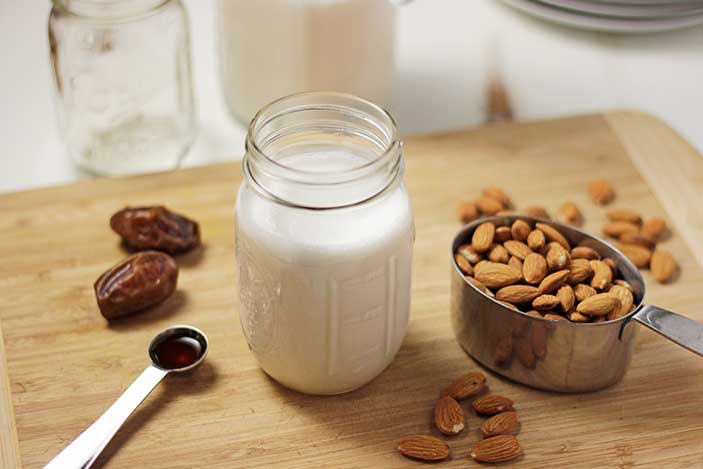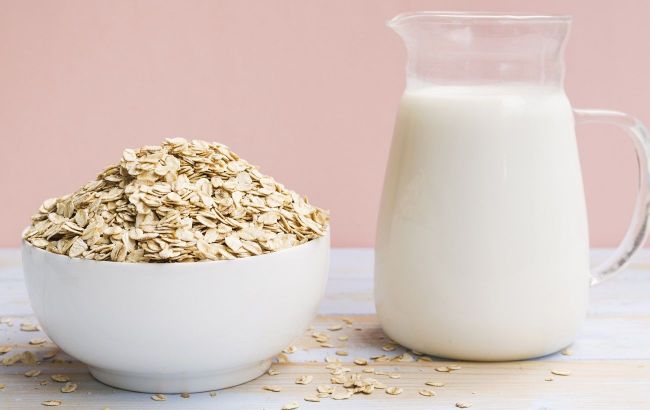We are currently experiencing a full-force, non-dairy milk revolution.
Not long ago, soy and almond milk dominated cafés and grocery store aisles alike. However, the market for alternative milks has significantly diversified, with obscure options like macadamia, pea, flax, and hemp emerging as creamy plant-based milks that outshine traditional soy and almond milks.
Among these alternatives, one non-dairy milk has gained more popularity than most: oat milk. Made from oats, oat milk has recently gained attention and for good reason. Its sweet and creamy yet light and delicate taste profile closely resembles cow’s milk, making it the perfect alternative for those who crave their daily dairy fix but want to cut back for health or environmental reasons.
If you’re new to the non-dairy scene, you may have heard people raving about oat milk and wondered if it’s too good to be true. It’s time to find out. This is the untold truth of oat milk.
Oat milk has been around longer than you think
Oatly, a well-known oat milk brand, has been on the market for nearly three decades. Rickard Oste, a researcher at Lund University in Sweden, began producing oat milk in the ’90s while researching milk alternatives for those with lactose intolerance. He used oats because they are a prominent crop in Sweden.
When Oste perfected the process, he founded Oatly and sold the milk to a small but devoted crowd of milk-loving Swedes. The company’s milk never made its way across the pond until 2016, when it took American markets by storm.
Oat milk could dethrone almond milk as the most popular non-dairy milk

Oat milk’s rapid increase in popularity could spell trouble for another non-dairy milk: almond milk. Almond milk quickly knocked soy milk from its position as the top plant-based milk when it was first introduced to mainstream markets. However, almond milk has faced criticism for not being environmentally sustainable and for being less satisfying than newer alternatives.
Oat milk could be the vegan milk that dethrones almond milk. According to Bloomberg Businessweek, oat milk sales jumped from $4.4 million in 2017 to $29 million in 2019. While this is still far from almond milk’s $1 billion in sales, most of the world’s oats are used for animal feed, meaning that the oat milk industry has plenty of room to expand.
There was a huge oat milk shortage when Oatly first hit U.S. markets
Oatly’s first forays into the U.S. market were wildly successful, so much so that they struggled to keep up with America’s newfound appetite for their plant-based milk. Oatly ran into a problem: they were all out of oat milk. There just wasn’t enough supply for America’s ravenous demands.
Americans who needed their daily dose of oat milk took to Amazon, where vendors were listing cartons for upwards of $200. However, the shortage ended after Oatly built its first factory on American soil in the spring of 2019.
You can easily make oat milk at home

While Oatly and other popular oat milk brands use fancy processes to make their oat milk creamy, you can make an unprocessed and equally healthy version at home. All you need is some oats, water, a fine mesh strainer, and a high-speed blender.
Simply soak the oats in water overnight and then blend until smooth and creamy. You can add sweeteners like coconut nectar or maple syrup to boost the flavor profile. After blending, pour the mixture through a strainer to remove any sediment.
Oat milk is lower in protein than other alternative milks
Considering that oats are a grain rather than a protein-packed nut or legume, oat milk tends to have less protein than some other milks, like soy milk and pea milk. A one-cup serving of oat milk typically only has about three grams of protein, while the average serving of dairy milk has about eight grams of protein.
Oat milk is a bit high calorie

Oat milk is typically higher in calories than other non-dairy milks. A serving of oat milk typically contains about 120 calories, which is about four times as much as the average one-cup serving of almond milk. However, this is still lower than the average serving of whole cow’s milk, which typically has about 150 calories per serving.
Oat milk tends to be higher in carbs than other non-dairy milks
Oat milk is higher in carbohydrates than other non-dairy milks because oats are a grain. The average serving of unsweetened oat milk contains around 16 grams of carbohydrates. Soy milk can have anywhere from 3 to 15 grams per serving, depending on the brand and whether or not it’s sweetened, and coves milk usually has 11 to 13 grams.
Oat milk is the environmentally sustainable alternative
Dairy is not environmentally sustainable, and pretty much every non-dairy milk on the market is better for the environment than cow’s milk. However, some non-dairy milks are better than others. Almond milk, for example, is a notoriously unsustainable non-dairy milk.
Oat milk could be one of the most viable alternatives. Oats are mostly grown in colder, northern areas like Canada and Scandinavia, so growing large quantities of them doesn’t require the same levels of deforestation that many other crops do.
Oat milk is a good source of dietary fiber
Oats are incredibly rich in dietary fiber, and as a result, oat milk is also a great source of fiber. Oats contain a special type of fiber known as beta-glucan, which has been found to have cholesterol-lowering effects.
Beta-glucan also provides the body with prebiotics, which help stimulate your body’s already-existing probiotics, ultimately aiding in digestion and ensuring that your body fully absorbs nutrients from all the other healthful foods you’re eating.
Oat milk froths up better than other non-dairy milks
Steamed oat milk is second to none when it comes to non-dairy milk and coffee pairings. Baristas all over the country are becoming oat milk converts, as the milk’s neutral flavor profile lends itself well to creamy espresso-based beverages like lattés, mochas, and flat whites.
Oat milk also froths up really well when you steam it, creating the perfect microfoam for a non-dairy cappuccino. Special barista blends for oat milk have been popping up in coffee shops across the country, specifically formulated so that baristas can easily foam them up without having to switch up their steaming technique too much.
Oat milk could potentially have anti-cancerous properties
Oats may be able to ward off cancer. Beta-glucan, the special fiber that’s present in oats, has been shown to have some cytotoxic effects when introduced to human melanoma cells. This means that beta-glucan actually killed off malignant skin cancer cells.
However, more research needs to be done before coming to any conclusions about oats and their cancer-fighting potential.
Many brands of oat milk are gluten-free
Oats are naturally gluten-free, but they are often contaminated with small traces of gluten because they are frequently processed in the same facilities as barley, wheat, and rye. It’s important for gluten-sensitive individuals to check whether the brand and flavor of oat milk they’re purchasing is certified as gluten-free.
In the U.S., several oat milks available are gluten-free or have gluten-free options. Just make sure to read the label.








